Unit 3
unit3-课文精讲

His famous stories
The Adventures of Tom Sawyer; The Adventures of Huckleberry Finn.
Mark Twain: (1835—1910)
The greatest humorist of the 19th
century American literature.
Real name of MT Meaning of his pen name Birth date
Samuel Langhorne Clemens river
1835 (died 1910)
Birth place
Florida
Place where he grew up
In Hannibal, Missoouri, along the Mississippi River.
亨 利:是的,从旧金山来。
罗德里克:你对伦敦熟悉吗?
HENRY: That's right, from San Francisco.
亨 利:一点儿也不熟,这是我第一次
来伦敦。
RODERICK: How well do you know London?
HENRY: Not at all, it's my first trip here.
RODERICK: Young man, would you step inside a moment, please?
HENRY: Who? Me, sir?
RODERICK: Yes, you.
OLIVER: Through the front door on your left.
HENRY: (A servant opens a door) Thanks.
Unit3词汇及翻译

Unit 31.There are aways people who dream to make a(n) from gambling(赌博),even though they know the chances are slim(苗条的、微小的).总有一些人梦想着从赌博中发财,即使他们知道机会很渺茫。
young because he couldn’t work out easy mathematical(数学的) calculations(计算)在发明家托马斯·爱迪生小的时候,被视为是一个傻孩子,因为他连简单的数学运算都算不出来。
犯罪嫌疑人) for about two days before they finally caught him in a deserted warehouse(仓库).警察追赶抢劫嫌疑犯大约两天之后,他们终于在一个废弃的仓库里抓到了他。
运动、活动) to raise money for the girl who has caught a rare(rare) disease(疾病).地方报社开展了一个为患有稀有疾病的女孩捐款活动。
5.Rock climbing is attractive(有吸引力的) especially to young peoplebecause it is always with hardship(困难) and adventure.攀岩是具有吸引力的,尤其是对年轻人来说,因为它总是伴随着困难和冒险。
6.The face value(面值) of the bill(账单、钞票(内在的) value is nothing but that of a piece of paper.该票据面值为一美元,但其内在价值只是一张纸。
7.Having won several championships in international matches recently,hecurrently(目前among the world’s professional tennis players.在最近的国际比赛中赢得了几次冠军,他目前在世界上职业网球选手中排名第二。
人教版九年级英语全册教师用书:Unit 3
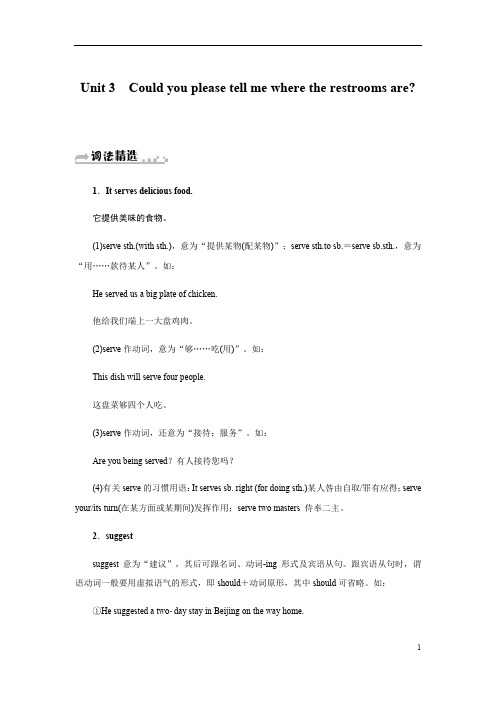
Unit 3Could you please tell me where the restrooms are?1.It serves delicious food.它提供美味的食物。
(1)serve sth.(with sth.),意为“提供某物(配某物)”;serve sth.to sb.=serve sb.sth.,意为“用……款待某人”。
如:He served us a big plate of chicken.他给我们端上一大盘鸡肉。
(2)serve作动词,意为“够……吃(用)”。
如:This dish will serve four people.这盘菜够四个人吃。
(3)serve作动词,还意为“接待;服务”。
如:Are you being served?有人接待您吗?(4)有关serve的习惯用语:It serves sb. right (for doing sth.)某人咎由自取/罪有应得;serve your/its turn(在某方面或某期间)发挥作用;serve two masters 侍奉二主。
2.suggestsuggest意为“建议”,其后可跟名词、动词-ing形式及宾语从句。
跟宾语从句时,谓语动词一般要用虚拟语气的形式,即should+动词原形,其中should可省略。
如:①He suggested a twoday stay in Beijing on the way home.他建议回家途中在北京停留两天。
②My father suggested sending for a doctor at once.我父亲建议马上派人请个医生。
③The teacher suggested that we (should) speak English as much as possible in class.老师建议我们尽可能在课堂上多讲英语。
3.depend on取决于depend on+名词/代词/宾语从句,意为“视……而定;取决于……”。
Unit 3 知识点详解

1.I’m going to exercise.我将要去锻炼。
exercise锻炼,动词;锻炼,名词exercise=take exercise=take some exercise锻炼2.Are you going to climb a hill?你将要去爬山吗?climb爬,及物动词climb a hill爬山3.You need to exercise and keep fit.你需要去锻炼和保持健康。
need需要,及物动词need to do sth需要去做某事need to exercise需要去锻炼keep保持,系动词fit健康的,形容词keep fit保持健康=keep healthy=stay healthy4.This hill isn’t as high as a real one!这座山没有真的山那么高!high高的,形容词as high as和...一样高(as...as中间加形容词的原形)not as high as不如,没有...高real真正的,形容词a real hill一座真正的山5.Let’s enjoy ourselves!让我们好好享受吧!let’s=let us让我们let让,及物动词let sb do sth让某人做某事Let us play together.让我们一起玩。
enjoy喜欢,享受,及物动词enjoy oneself好好享受,玩得开心enjoy yourself你自己玩得开心enjoy ourselves我们自己玩得开心6.Yesterday I took a boat trip under the famous Harbour Bridge and went past the Sydney Opera House.昨天我在著名的港湾大桥下乘船旅行,经过了悉尼歌剧院。
trip短途旅行,可数名词take a boat trip乘船旅行under在...的下面under the famous Harbour Bridge在港湾大桥下面go past经过=passthe Sydney Opera House悉尼歌剧院go past the Sydney Opera House=pass the Sydney Opera House经过悉尼歌剧院7.I’m having a great time in Australia!我在澳大利亚玩得很开心!have a great time=have a good time=have a nice time=have a wonderful time玩得很开心8.Take care!保重!care照顾,关怀,名词take care保重take care of...照顾...=look after...take good care of...照顾好=look after...welltake good care of yourself=look after yourself well照顾好你自己9.We’re sitting in a little coffee shop by the River Seine.我们正坐在塞纳河旁边的一个小咖啡馆里面。
人教版九年级英语Unit3单词、课文知识梳理,词汇句式精讲
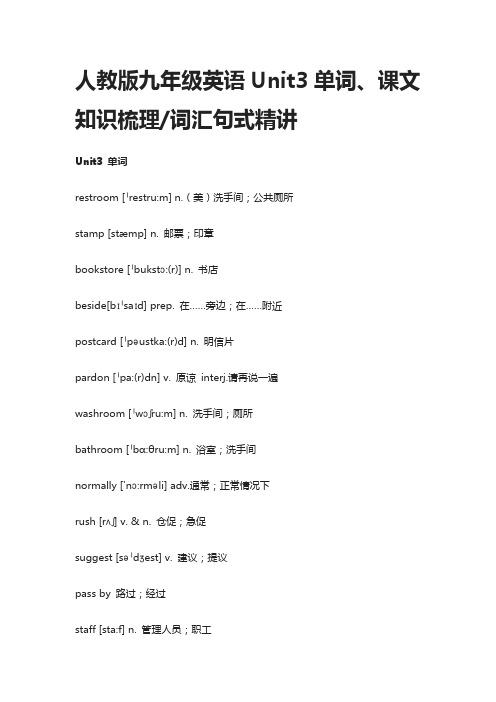
人教版九年级英语Unit3单词、课文知识梳理/词汇句式精讲Unit3 单词restroom [ˈrestru:m] n.(美)洗手间;公共厕所stamp [stæmp] n. 邮票;印章bookstore [ˈbukstɔ:(r)] n. 书店beside[bɪˈsaɪd] prep. 在……旁边;在……附近postcard [ˈpəustka:(r)d] n. 明信片pardon [ˈpa:(r)dn] v. 原谅interj.请再说一遍washroom [ˈwɔʃru:m] n. 洗手间;厕所bathroom [ˈbɑ:θru:m] n. 浴室;洗手间normally ['nɔ:rməli] adv.通常;正常情况下rush [rʌʃ] v. & n. 仓促;急促suggest [səˈdʒest] v. 建议;提议pass by 路过;经过staff [sta:f] n. 管理人员;职工grape [greip] n. 葡萄central [ˈsentrəl] adj. 中心的;中央的Nearby [ˌnɪrˈbaɪ] adj.附近的;邻近的adv.在附近;附近Pardon me 抱歉, 对不起;什么,请再说一遍mail [meil] v. 邮寄;发电子邮件n. 邮件east [i:st] adj. 东方的;东部的adv.向东;n.东方fascinating [ˈfæsineitiŋ] adj.迷人的;有吸引力的. Inexpensive[ˌɪnɪkˈspensɪv] adj.不昂贵的Uncrowded [ʌnˈkraʊdɪd] adj.不拥挤的;人少的convenient [kənˈvi:niənt] adj. 便利的;方便的mall [mɔ:l] n. 商场;购物中心clerk [kla:k][kl:rk] n. 职员corner [ˈkɔ:(r)nə(r)] n. 拐角;角落politely [pəˈlaitli] adv. 礼貌地;客气地request [riˈkwest] n. 要求;请求direction [diˈrekʃn] [daiˈrekʃn] n. 方向;方位correct [kəˈrekt] adj. 正确的;恰当的polite [pəˈlait] adj. 有礼貌的;客气的. direct [diˈrekt, daiˈrekt] adj. 直接的;直率的. speaker [ˈspi:kə] n.讲(某种语言)的人;发言者whom [hu:m] pron. 谁;什么人impolite [ˌɪmpəˈlaɪt] adj. 不礼貌的;粗鲁的address [əˈdres], [ˈædres] n.住址;地址;通讯处. Underground [ˈʌndəɡraʊnd] adj.地下的;n.地铁Parking lot n.停车场course [kɔ:(r)s] n. 课程;学科Italian [Iˈtæli ən] adj.意大利\人的;n.意大利人\语Tim [tim] 蒂姆(男名)Unit3 知识梳理【重点短语】1.a pair of 一对,一双,一副2.between A and B 在a和b之间3.on one’s / the way to 在去……的路上4.pardon me 什么,请再说一遍5.pass by 路过经过6.look forward to 盼望期待7.excuse me 打扰了请原谅8.get some information about 获取有关……的一些信息9.turn left\right 向左\向右转10.go past 经过路过11.a little earlier 早一点儿12.a good place to eat 一个吃饭的好地方13.in different situation 在不同的情况下14.on time 准时按时15.get to 到达16.have dinner 吃晚餐17.on one’s / \the right在右边e on 快点请过来19.the shopping center 购物中心20.the corner of....... 的角落/拐角处21.lead into 导入,引入【重点句型】1.问路常用的句子:①Do you know where is …?②Can you tell me how can I get to …?③Could you tell me how to get to …?④Could/Will/Would you please tell me sth.表示十分客气地询问事情Could you tell me how to get to the park?请你告诉我怎么才能去邮局好吗?2. decide to do 决定做…...She decided to go to have lunch. 她决定去吃午餐。
人教版九年级英语Unit3重点知识归纳
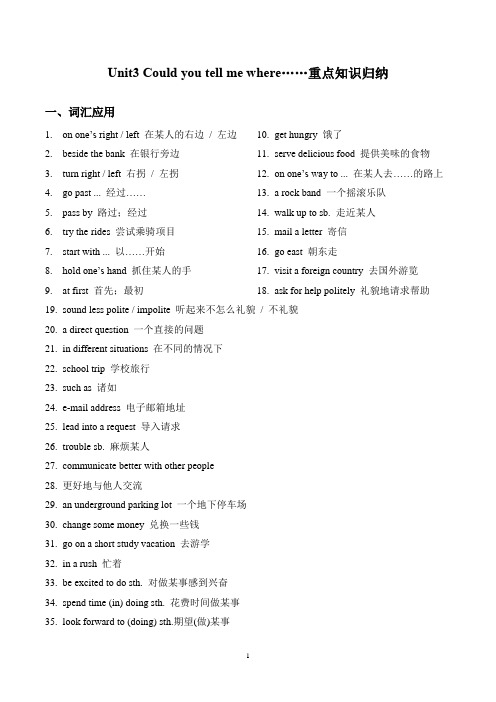
Unit3 Could you tell me where……重点知识归纳一、词汇应用1.on one’s right / left在某人的右边/ 左边2.beside the bank 在银行旁边3.turn right / left 右拐/ 左拐4.go past ... 经过……5.pass by 路过;经过6.try the rides 尝试乘骑项目7.start with ... 以……开始8.hold one’s hand 抓住某人的手9.at first 首先;最初10.get hungry 饿了11.serve delicious food 提供美味的食物12.on one’s way to ... 在某人去……的路上13.a rock band 一个摇滚乐队14.walk up to sb. 走近某人15.mail a letter 寄信16.go east 朝东走17.visit a foreign country 去国外游览18.ask for help politely 礼貌地请求帮助19.sound less polite / impolite 听起来不怎么礼貌/ 不礼貌20.a direct question 一个直接的问题21.in different situations 在不同的情况下22.school trip 学校旅行23.such as 诸如24.e-mail address 电子邮箱地址25.lead into a request 导入请求26.trouble sb. 麻烦某人municate better with other people28.更好地与他人交流29.an underground parking lot 一个地下停车场30.change some money 兑换一些钱31.go on a short study vacation 去游学32.in a rush 忙着33.be excited to do sth. 对做某事感到兴奋34.spend time (in) doing sth. 花费时间做某事35.look forward to (doing) sth.期望(做)某事e on 加油;快点儿37.pardon me 抱歉,对不起;什么,请再说一遍二、重点句型1.问路常用的句子:①Do you know where is … ?①Can you tell me how can I get to …?①Could you tell me how to get to …?①Could/Will/Would you please tell me sth.表示十分客气地询问事情Could you tell me how to get to the park?请你告诉我怎么才能去邮局好吗?2. decide to do 决定做…...She decided to go to have lunch. 她决定去吃午餐。
人教版高中英语必修三Unit3全课件
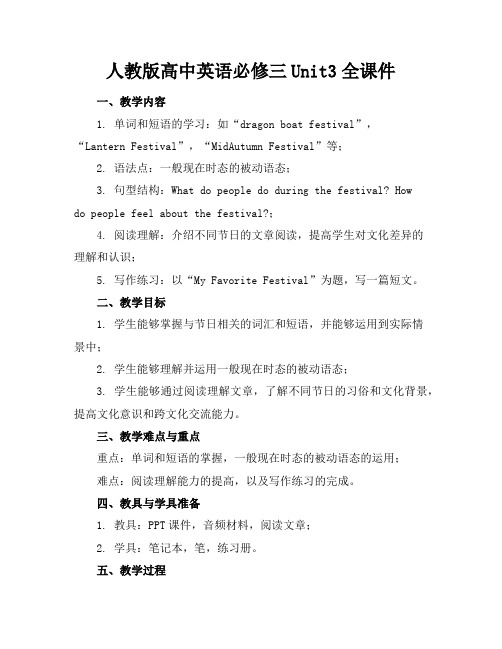
人教版高中英语必修三Unit3全课件一、教学内容1. 单词和短语的学习:如“dragon boat festival”,“Lantern Festival”,“MidAutumn Festival”等;2. 语法点:一般现在时态的被动语态;3. 句型结构:What do people do during the festival? Howdo people feel about the festival?;4. 阅读理解:介绍不同节日的文章阅读,提高学生对文化差异的理解和认识;5. 写作练习:以“My Favorite Festival”为题,写一篇短文。
二、教学目标1. 学生能够掌握与节日相关的词汇和短语,并能够运用到实际情景中;2. 学生能够理解并运用一般现在时态的被动语态;3. 学生能够通过阅读理解文章,了解不同节日的习俗和文化背景,提高文化意识和跨文化交流能力。
三、教学难点与重点重点:单词和短语的掌握,一般现在时态的被动语态的运用;难点:阅读理解能力的提高,以及写作练习的完成。
四、教具与学具准备1. 教具:PPT课件,音频材料,阅读文章;2. 学具:笔记本,笔,练习册。
五、教学过程1. 情景引入:通过播放音频材料,引导学生听懂并模仿音频中的节日场景,激发学生对节日的兴趣;2. 新课内容展示:教师通过PPT课件,展示与节日相关的词汇和短语,引导学生学习并掌握;3. 阅读理解:教师分发阅读文章,指导学生进行阅读理解,通过提问的方式检查学生的理解程度;4. 语法讲解与练习:教师讲解一般现在时态的被动语态,并通过例句和练习题让学生进行实际操作;5. 小组活动:学生分组讨论,分享自己喜欢的节日,并运用所学词汇和短语进行表达;6. 写作练习:教师布置写作任务,学生以“My Favorite Festival”为题,进行短文写作;六、板书设计1. 节日词汇和短语的列表;2. 一般现在时态的被动语态的句型结构;3. 阅读理解文章的关键词汇;4. 写作练习的要求和评分标准。
Unit 3 参考译文及答案
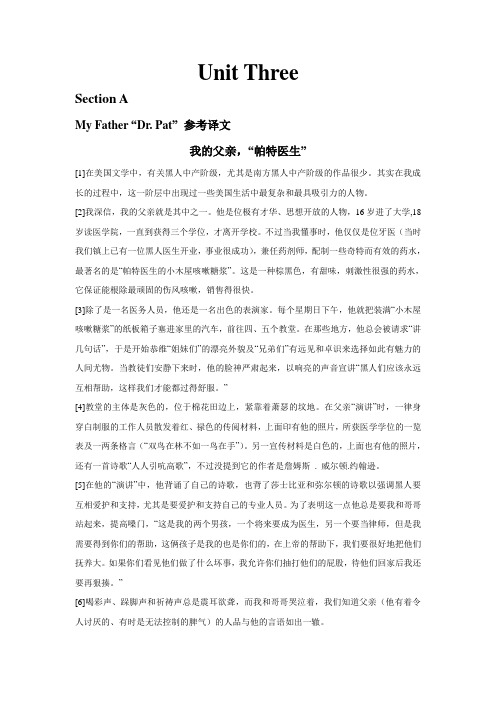
Unit ThreeSection AMy Father “Dr. Pat”参考译文我的父亲,“帕特医生”[1]在美国文学中,有关黑人中产阶级,尤其是南方黑人中产阶级的作品很少。
其实在我成长的过程中,这一阶层中出现过一些美国生活中最复杂和最具吸引力的人物。
[2]我深信,我的父亲就是其中之一。
他是位极有才华、思想开放的人物,16岁进了大学,18岁读医学院,一直到获得三个学位,才离开学校。
不过当我懂事时,他仅仅是位牙医(当时我们镇上已有一位黑人医生开业,事业很成功),兼任药剂师,配制一些奇特而有效的药水,最著名的是“帕特医生的小木屋咳嗽糖浆”。
这是一种棕黑色,有甜味,刺激性很强的药水,它保证能根除最顽固的伤风咳嗽,销售得很快。
[3]除了是一名医务人员,他还是一名出色的表演家。
每个星期日下午,他就把装满“小木屋咳嗽糖浆”的纸板箱子塞进家里的汽车,前往四、五个教堂。
在那些地方,他总会被请求“讲几句话”,于是开始恭维“姐妹们”的漂亮外貌及“兄弟们”有远见和卓识来选择如此有魅力的人间尤物。
当教徒们安静下来时,他的脸神严肃起来,以响亮的声音宣讲“黑人们应该永远互相帮助,这样我们才能都过得舒服。
”[4]教堂的主体是灰色的,位于棉花田边上,紧靠着萧瑟的坟地。
在父亲“演讲”时,一律身穿白制服的工作人员散发着红、禄色的传阅材料,上面印有他的照片,所获医学学位的一览表及一两条格言(“双鸟在林不如一鸟在手”)。
另一宣传材料是白色的,上面也有他的照片,还有一首诗歌“人人引吭高歌”,不过没提到它的作者是詹姆斯. 威尔顿.约翰逊。
[5]在他的“演讲”中,他背诵了自己的诗歌,也背了莎士比亚和弥尔顿的诗歌以强调黑人要互相爱护和支持,尤其是要爱护和支持自己的专业人员。
为了表明这一点他总是要我和哥哥站起来,提高嗓门,“这是我的两个男孩,一个将来要成为医生,另一个要当律师,但是我需要得到你们的帮助,这俩孩子是我的也是你们的,在上帝的帮助下,我们要很好地把他们抚养大。
- 1、下载文档前请自行甄别文档内容的完整性,平台不提供额外的编辑、内容补充、找答案等附加服务。
- 2、"仅部分预览"的文档,不可在线预览部分如存在完整性等问题,可反馈申请退款(可完整预览的文档不适用该条件!)。
- 3、如文档侵犯您的权益,请联系客服反馈,我们会尽快为您处理(人工客服工作时间:9:00-18:30)。
A Teaching Plan for Unit 3Ⅰ. Time: 10 class hoursⅡ. Contents:Listening and SpeakingSection A : Where Principles Come FirstSection B: Cultural Differences in Western and Japanese Decision-MakingⅢ. Suggested Timetable:1.The first two-class-hour session for listening and speaking2.Next four-class-hour session for Section A3.The fourth two-class-hour session for exercise of Section A4.The fifth two-class-hour session for Section B and Section CⅣ. Aims and Requirements:Listening and Speaking:1.Train the students’ ability to understand the main idea and grasp important detailsof the listening texts.2.Give the students a chance to exchange views on the texts they have heard toenable them to have a deeper understanding of the texts.Section A: Where Principle Come First1.understand the main idea and structure of the text;2.learn some rules of interpreting new vocabulary and usage related to culture inEnglish;3.grasp the key language points and grammatical structures in the text;4.conduct a series of reading, listening, speaking and writing activities related to thetheme of the text.Section B: Cultural Differences in Western and Japanese Decision-Making1. Learn the reading skill of predicting the author’s ideas2. Master some basic language points in the text3. Use the reading skill to revise section AⅤ. Focal Points and Difficult Points:Listening and Speaking:1.Enable students to be familiar with the passage listening skill2.Grasp some words and expressions which often appear in CET-4Section A: Where Principle Come First1. Understand of the operating principle of the Hyde School.2. Try to know how to use examples to support a general statement.3. Grasp several CET-4 key words.Section B: Cultural Differences in Western and Japanese Decision-Making1.Ask the students to retell the story2.Grasp several important wordsⅥ. Suggested Teaching Procedure and Methodology:Listening and Speaking:1.Pre-listening Task: arrange the students in pairs and ask them to discuss thefollowing questions:①What does the Hyde School see its main job as when educating children?②How does the Hyde School achieve this goal?③How important are the parents in Hyde’s goal in respect of children?2.Listening to Text 13.Speaking Tasks: ask the students to get into pairs and select a pair to present theirviews in class.Section A: Where Principle Come FirstPart One Pre-reading ActivitiesStep 1: Use 2 minutes read the introduction about Hyde School.The Hyde of today upholds Five Words as the core principles on school campuses in Bath, Maine and Woodstock, Connecticut and in a growing number of public and private schools: Courage, Integrity, Leadership, Curiosity, and Concern.Hyde's program has three emphases:Character development - Hyde consists of a fully integrated program of character development. Character is not an "add-on" at Hyde. It is the foundation from which all curriculum is developed, including academics, athletics, performing arts, community service, and on-campus jobs.Family renewal - results from real parent participation. The parents are not involved to support the work of the faculty; they work to develop their own character. The Family Education Program is the distinctive quality of Hyde's approach.College preparation - more than 98% of Hyde's graduates attend four-year colleges.Although some schools might excel with one of these emphases singularly, we submit that Hyde is the best, indeed the only choice for prospective families who seek to accept the challenge of all of them collectively.The Hyde Promise:Hyde helps students learn, embrace, and adopt a character compass that will guide them for the rest of their lives. This compass has four points:1. An explicit philosophy of character in the form of Five Words: Courage, Integrity, Leadership, Curiosity, and Concern;2. The most dynamic student peer culture in American education;3. A dedicated faculty that will go to the ends of the earth to help teenagers and families connect with their potentials;4. The opportunity for parents, the primary teachers, and the entire family to participate and gain individual and collective strength.Step 2: Answer the following questions:Question One: What are the core principles of the Hyde School ?Question Two: What are the three emphases of Hyde’s program?Part Two Text AnalysisThe essay is made up of 4 parts with each part answering one question:Part 1: (paras:1--2)Step 1: Question---What are the principles?The principles of the Hyde School:Teach students the merit of such values as truth, courage, integrity…and academic achievement naturally follows; the school has received considerable publicity for its work with troubled youngsters.And the school advocates that they prepare kids for a way of life by cultivating a comprehensive set of principles that can affect all kids.Step 2: Language points1. Publicity: providing information in order to attract public attention; advertising.---a publicity campaign宣传运动(campaign: series of planned activities with a particular social, commercial or political aim.)eg: a campaign against nuclear weaponsan advertising campaignan election campaignanti-corruption campaign)---public---publish--publication--publishing2 Comprehensive: that includes (nearly) everything综合的,全面的eg: a comprehensive description / reporta guide book giving comprehensive information on the area.---comprehensible: that can be understood fully能充分理解的eg: The book is written in clear, comprehensible language---Comprehend---Comprehensioneg: a comprehensive test综合测试a comprehension test理解力测试Part 2: (paras:3---11)Step 1: Question---Are the Hyde principles accepted by other schools?The efforts to make the Character First idea accepted by public schools:A)Failure in spreading the Hyde principles: (3)The first Hyde public school program opened in September 1992, which was suspended within months.Reasons: Teachers protested the program’s demands and the strain associated with more intense work.B)The Hyde School principles being appreciated: (4--11)The Hyde Foundation opened another program in a public high school in the suburbs of New Haven, Connecticut. At the school the quest for truth is also widespread. Students were asked to exchange their evaluations on their class performance.Step 2: Language points1 Suspend:a.) stop or cause to be not activeeg: some rail services were suspended during the strike.b.) hang sth upeg: a lamp was suspended from the ceiling.---Suspender--Suspension suspension bridge吊桥---Suspect suspect sb (of sth / doing sth): feel that sb is guilty of sth without certain proof.Eg: suspect sb’s motivesWho do the police suspect (of the crime) ?怀疑The police are interrogating two suspects.嫌疑犯His statements are suspect.不可信的---Suspicion---suspicious词汇扩展:specifyspecificSu spect(看)-----special------------------------------------------------------ speciallyaspect specialityprospect specialistperspective especiallyinspect -------inspection specimenexpect------expectation-----unexpectedrespect----respectful-----respectiveSeveral usages:In the right/ proper/ historical perspective 以…的观点an eye specialist眼科医生2Minority:a.) a small group in a nation differing from others in race, religion, language.Eg: They have called for greater numbers of women and minorities on the faculty.b.) (usu. sing) a small number or part.Eg: Only a minority of British households do/does not have a car.---m ajorityEg: The majority of people seem to prefer TV to radio.---majorEg: Her major is English.She is an English major.She majors in English.Part 3: (paras:12---16)Step 1: Question---What are the detailed principles or approaches advocated by the Hyde School?The Hyde School’s approaches to education:A)The school assumes: (12)Every human being has a unique potential based on character, not intelligence orwealth.Conscience and hard work are valued.Success is measured by growth, not academic achievement.Students are required to take responsibility for each other.B) Cause and management: (13)The school provides preparation for college, with a curriculum complete with English, history, math and science.All students are required to take performing arts and sports, and to provide a community service.For each course, students get a grade for academic achievement and for “best effort”.C) A key ingredient in the Hyde mixture is requiring commitment and participation from parents.(14)Some public school parents find it difficult for them to participate.(15)Once the parents are convinced, Hyde’s requirement of parents ‘ participation should work well in public schools. (16)Step 2: language points1. moral:(pl) standards of behavior; principles of right and wrong.行为标准,道德规范Eg: Western ideas and morals 西方理念和道德观They have no morals.---Morale: state of confidence, enthusiasm, determination .. of a person or group at a particular time. 士气,精神状态Eg: The team’s morale was high before the match.2. admission: permission to enter a school, a club, a public place…Eg: All those who were not wearing a tie were refused admission to the club.---Admittance: being allowed to enter a place (esp. a private one); the right to enter. Eg: No admittance!The journalist tried to gain admittance to the minister’s office.3. attendance:a.) the number of people presenteg: They are expecting a large attendance at the meeting.b.) being present somewhere.Eg: Attendance at lecture is necessary.---AttendEg: Attend to your work and stop talking.专心,仔细考虑A nurse attends to his needs.照顾,关照They have a quiet wedding—only a few friends attended (it).出席---Attendant服务员4. utmosta.) the greatest, furthest or most extreme degree or point.Eg: The best is to continue to attack him to the utmost of our power.b. )the greatest, the most possible.Eg: a message of utmost importance.----Do /try one’s utmost (to do sth):try one’s bestEg: I did my utmost to help.He will try his utmost to help them by means of his conventional medical knowledge.Part 4: (paras: 17--20)Step 1: Question 4---What are the beneficial results of the Hyde School’s principles?Beneficial results for the teachers as well as the students:A)Beneficial results for the teachers: (17)We really begin to focus on having a fruitful relationship with each student, but not teacher to the material and then to the student.The teacher-student relationship is taken even further at Hyde: Faculty evaluations are conducted by the students.B)Beneficial results for the students: (18--20)One example: Jimmy DiBattista, 19, who had seen his future as jail, not college, had been turned to the positive attitude. Now he plans to attend a university.Step 2: Language Points1.Faculty:a.) the people who teach in a school or a college.eg: The faculty has /have been invited to the meeting.b.) the special ability to do sth.eg: the faculty of hearing /sight.听力/视力c.) one department in a university, college..eg: the Faculty of Law法律系the Faculty of Social and Political Sciences. 社会政治科学系Part Three ExerciseComplete the following sentences with the words or phrases given below.( Work out see…as be scheduled to do reform strain )1.Most people____.(认为他的行为可能很危险)2.The plan_____.(定于下午五点起飞)3.He______ at work.(承受着很大的压力)4.He’s done wrong in the past but he ______.(在努力改过自新)5.we’ll leave it to the committee to ______.(制定计划的具体细节)Key:1. Most people see his action as possible dangerous.2. The plane is scheduled to take off at 5 pm.3. He is under a lot of strain at work.4. He’s done wrong in the past but he has made great efforts to reform.5. we’ll leave it to the committee to work out the details of the plan.Part Four WritingOne of the writing techniques is a general statement being supported by examples (examples and illustrations).Step 1: Please have a look at paragraph 5-11, 18-20, you can find out how the author has his general statement supported by a specific example.Step 2: Read 2 examples and try to discuss how to write this kind of composition. Example 1:Different cultures have different perceptions of time. Americans, for example, place a high value on punctuality, Latin Americans, on the other hand, have a relaxed attitude about being on time for appointments. Another example of a culture with a relaxed feeling about time is the Sioux Indian nation, which does not even have a word for “lateness”.Example 2:My roommate Paul possesses the characteristics of a good student. One of his characteristics is always being prepared for classes. For example,when his philosophy professor assigns a class discussion on the ideas of Kant, he goes to the library and does extensive research on the subject. In addition, when his English instructor assigns an out-of-class essay, he brings to class the final copy of an essay that he has revised several times.Step 3:The teacher explain the method about examples and illustrations.例证法(examples and illustrations)是通过列举具有典型性、生动具体的实例对概念或观点进行阐述的一种方法。
